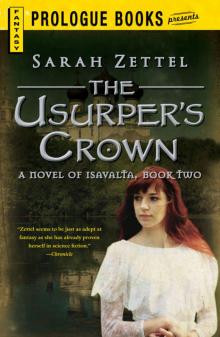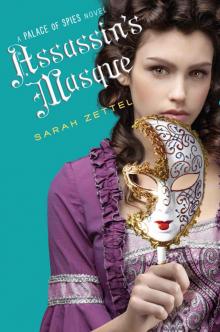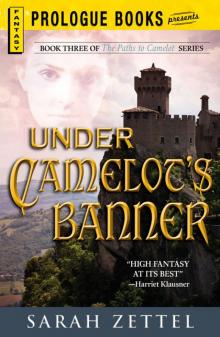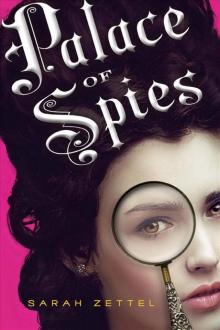- Home
- Sarah Zettel
Laurel Page 2
Laurel Read online
Page 2
Since then, the world had turned over. Father was dead, murdered by his son and heir. War had almost come to their home, but Laurel and her sister, in concert with the queen and the knights Lancelot and Gareth, had just managed to turn it aside. For this service, Queen Guinevere, heirless and likely to remain so, had given over the throne of Cambryn to the family line of Carnbrea. She had also given Laurel’s younger sister, Lynet, in marriage to the newly knighted Sir Gareth.
This tumultuous progression of events left unmarried Laurel with the title of queen, but with no current means of producing a legitimate heir. Without an heir, she could rule, but could not provide long-term stability for her now royal family, or their fractious kingdom. Even before the high king’s ambassadors had come with their marriage proposal, Laurel had made up her mind to abdicate the throne in Lynet’s favour. She had not wanted to give their neighbors and chieftains the chance to decide they should make the change in a less civilized fashion.
‘You’re being a fool, Laurel,’ Lynet had said. ‘You are known and respected for your strength and your wisdom. No one would dare try to bring you down.’
‘Strength and wisdom are all very well, but our allies and our lords want safety. You and Gareth can give them that. I, as I am, cannot.’
‘Then marry where you may stay in Dumonii lands.’
‘Who, Lynet?’ Laurel had replied coldly. ‘After what I have done, and what they have heard, which of our worthy neighbours will have me?’
Lynet had bitten her lip at that, and made no answer.
Laurel had left the bed chamber they shared, and went to meet Sir Bedivere, the high king’s ambassador in Cambryn’s great hall. There, she gave her assent. She would come to Camelot and give herself in marriage to Sir Agravain, King Arthur’s nephew, the second of the sons of Lot, and heir to the throne of Gododdin.
Now, Laurel descended the curving stairs at a sedate pace, following Guinevere’s ladies and attempting not to tread on her own hems. She tried once again to call Sir Agravain’s face to mind, and once again, she failed. Sir Gawain, the eldest of Lot’s sons, she remembered well enough. Dark-haired and handsome, with a ready smile, Sir Gawain was the subject of great gossip among all the ladies of the court, and not a few of the men. He had been the one to head the procession that met Laurel at the quay. There, Laurel found his smile and charm had not dimmed during her absence, and this cheered her nervous spirits.
Sir Geraint, the third of the brothers, Laurel remembered mostly as a figure in the distance while training for war, or participating in some race or game. He was silent to the point of taciturn, but if one looked into his clear blue eyes, one could see the depth of warmth and humour there. Sir Gareth, the youngest, and now her brother by law, was an unduly handsome, cheerful, surprisingly stubborn man, dizzy in love with her sister.
Laurel had asked Gareth about his brother Agravain. She watched his face while he chose his words with utmost care.
‘His wits are keener than any man’s I know. He is brave, in his way … He keeps much to himself.’ Gareth hesitated.
His lower lip tucked itself beneath the upper, as if he had meant to bite it, but stopped himself. Laurel saw anew how young this husbandman was. ‘He will not suffer any fool, and acts more on his own counsel than that of others. This makes him seem hard. It is to my shame that I cannot say whether this is real or merely what he wishes men to see.’
With all this echoing in her memory, Laurel Carnbrea allowed herself to be led to the doors of Camelot’s great hall. The elaborately carved portals stood closed, flanked by an honour guard of six soldiers in shirts of shining mail with red ribbons tied about their spears. Between them stood four pages, all of them as nervously solemn as only young boys can be. This bright assemblage all bowed to Laurel and her entourage, and Laurel nodded solemnly in response.
Let this ceremony begin.
As if hearing her thought, the boys lined up and all four of them pulled open the doors to reveal the splendour of the great hall.
Dazzling light from torches, fires and tapers spilled out over Laurel in a wave of warmth. Gold flashed everywhere, reflecting the brilliant light and the stately music that rose in solemn and disciplined measure from harp, pipe and deep-bellied drum. Dazzled after the dim corridors, all Laurel could make out at first was a blur of scented colours; waxen scarlet, rush-tinged green, tallow blues, smoky grey and black, all the shades of stone and skin blended with lavender and lemon.
All this wreathed her round in a garland of heat and rustling cloth, setting her blood pounding. It seemed she had to step down a long way before the thin sole of her slipper found the mosaiced floor and she was able to walk forward. Laurel steeled herself and kept her pace stately. She knew her rank and worth. She was the one who had been entreated to do this thing. No one here would see her awed.
The whole of Camelot’s court filled that hall. Where before she had travelled dim corridors of stone, now Laurel walked down a straight aisle of particoloured humanity. Dark Britons and pale Saxons; the knights of the Round Table in their cloaks of madder red; lords and ladies in linen and silk, silver, bronze and gold. All of them watched her, craning their necks even as they made their polite bows. Despite the drum beats and lilting pipes. Laurel clearly heard her heart hammering.
What do they see, all these people? What have they heard of me?
It does not matter. I am here at the king’s command and the queen’s behest.
She fixed her gaze on the dais. It was no less crowded than the rest of the hall, but at least these were faces she knew. Her dazzled and. unnerved eyes could rest a moment on Queen Guinevere. Dignified and tall beside the High King, the queen wore her raiment of scarlet, white and gold easily. Her swan crown circled her wide brow lightly, as the companion torque did her throat.
Arthur, High King of all the Britons, also wore his wealth and dignity with an ease that came from familiarity and assurance. The scarlet tunic, the dragon crown decked with rubies, and the dragon torque at his throat; these were symbols of a majesty that was both God-given and hard earned. Awareness of this truth gave Arthur his majesty as much as any show of wealth and temporal power.
At the king’s left stood the crooked seneschal, Sir Kai. In his black garb and gold chain of office, he was a shadow waiting behind the light of kingship. The broad, handsome form of Sir Gawain, Arthur’s heir, all but obscured the seneschal, but Laurel knew Sir Kai watched her approach carefully. Sir Kai watched all things carefully and did not remain silent about what he saw. A fresh, cold, finger of fear touched Laurel’s spine.
Beside Gawain, stood Sir Bedivere, King Arthur’s one-handed ambassador who had brought the king’s offer to Laurel, and beside him stood the bronze and gold form of Sir Lancelot whom she remembered well, standing like a living testament to knightly glory.
But beside Sir Gawain stood another man. He was as lean as the seneschal, but as straight and black-haired as Sir Gawain. A Round Table knight’s madder red cloak fell across the shoulders of his green and silver tunic.
That was him. That was Sir Agravain, and Laurel had no time for more than that single glance. She had reached the dais now and must kneel in respect and obedience.
The musicians made their final roll and flourish. Her veil fell over her face, making a screen for her heated cheeks. Her breath was coming short. She needed to calm herself. She was no nervous child. She could not be seen to be afraid.
Footsteps touched against marble. A pair of embroidered slippers appeared in Laurel’s field of vision. A fine hand, the palm marred by some old stain, reached down to raise her up. The smile Queen Guinevere gave Laurel was small but fond, and showed mostly in her shining grey eyes.
‘My lord king,’ said Queen Guinevere in her mellow voice. ‘I ask you to make welcome Laurel Carnbrea, the lady of Cambryn.’
Arthur inclined his greying head regally. It was easy to discern the humour and sympathy in his bright blue gaze. ‘Be welcome once more, Laurel Carnbrea. May God bless
your arrival and the purpose which brings you here.’ These words were pitched to carry, a speech for the court, but the understanding in his eyes was for her, and for that moment at least, Laurel felt some measure of composure return. ‘Let me now make known to you Agravain mach Lot, knight of the Round Table, and heir to Gododdin.’
The brief calm the king imparted deserted her immediately. Laurel’s pulse jumped and her breath stuck in her throat. Sir Agravain walked down the four dais steps and for the first time, Laurel stood face to face with the man who would be her husband.
Sharp as a sword, the thought flitted through her mind. All about him was wiry and lean, as if God turned miserly with this creation’s flesh. Like his brothers, Sir Agravain was tall and had a wealth of raven-black hair, but where Gawain and Gareth were broad and open, Sir Agravain was closed. His face, while regular in its features, held no hint of either frankness or good humour. His dark eyes remained cool as they looked her over. Laurel was sure he missed no more details of her person than Meg had.
Despite her best resolve, Laurel’s composure trembled. At once, she fell back on ceremony, and made a deep curtsey. ‘God be with you, Sir Agravain,’ she said, grateful that her voice remained steadier than her nerve.
Sir Agravain returned a deep bow. ‘And with you, Lady Laurel.’ His voice was lighter than she expected. Each word was clean and precise, with only a trace of the accents of the north. ‘It is a great honour you do me and my house.’
She met his earth-brown eyes again. They seemed clear and honest, but she could see nothing deeper than his words in them. All about Sir Agravain was shut tight and bolted. She thought again of Gareth’s words. Here was a man who would show no more than he wanted the world to see.
Manners. Manners. They are all watching you. Indeed, while she hesitated, the queen’s smile had faltered the smallest amount.
‘It is my hope you will accept this token from my house to yours.’ Laurel signalled Meg to bring her maids forward. Between them, Cryda and Elsa carried a package wrapped in undyed cloth. This Meg unfolded to reveal a garment of saffron-dyed silk stitched over with costly threads in many colours.
Laurel had carefully questioned Gareth regarding Gododdin’s marriage customs. As it transpired, Gareth had left his home while still a child, and so knew very little first hand. He had, however, told her tradition dictated that the bride give her bridegroom his wedding tunic. So, with patience, if not with enthusiasm, Laurel set about making the garment. She now let Meg lay it across her outstretched arms so that she in turn could give it to Sir Agravain. Its saffron silk had come from Cambryn’s treasury, of the same origin as her blue. She had seen it cut generously, broad-collared, full-sleeved, and long-hemmed. Under her direction, and with her help, it had been richly worked with threads of emerald, scarlet, cobalt and gold, to shape a design of open-winged falcons, which were the sigil of Gododdin’s high house, and of sea waves, the sign of her own.
Agravain let her lay the garment in his hands. He looked down at this product of so much labour with his closed and shallow gaze. ‘Again, you honour me, my lady. I thank you.’ He bowed once more, and she made an answering curtsey, and then they looked at each other; the pair of them, surrounded by all the glory of Camelot’s court, to be husband and wife before tomorrow was finished, and neither found a single word to say.
Blessedly, the queen broke the silence before the moment could become truly awkward. She took both Laurel’s hands in hers.
‘Come, Laurel, sit with us.’
So saying, Queen Guinevere led Laurel up the steps of the dais. The servants at once began their complex dance, moving the thrones back to their place of state, bringing the carved chairs for the guests who would eat at the high table. Laurel sat at the queen’s right hand. Agravain sat at the king’s left, after his brother, Gawain. This removal meant further conversation between them would be impossible for the length of the meal. Laurel found she was grateful for this mercy of ceremony. Becoming tongue-tied in front of the entire court had left her shamed. She sat on her softly cushioned chair in uneasy silence while the trestles and boards were brought and the richly embroidered cloths spread for the feast.
Queen Guinevere always seemed to have the gift of reading thoughts, and Laurel’s were no secret to her. ‘Do not worry yourself,’ murmured the queen, touching Laurel’s hand lightly. ‘You will find your way.’ Other ladies and their lords began to mount the dais, pausing to make their obeisance before they took their place at the high table. ‘Now, here is one you must meet,’ said the queen, brightly. ‘This is the Lady Risa, wife to our Gawain.’
Lady Risa was a woman of medium stature, no longer young, but not yet to her middle years. What made her stunning was her red gold hair that hung down to her ankles, woven with gold threads and pearls. The lady looked fair and open, a good match for her husband, but there was, Laurel thought, something delicate about her, a hesitation of movement and smile, perhaps or a faded colour to her eye that made Laurel wonder if she was fully well.
‘I am glad to meet you, Lady Laurel,’ said Risa as she took her seat. ‘As we will soon be sisters, it is my great hope we will also be friends.’
The smile which accompanied these words reached Lady Risa’s eyes, and Laurel dearly hoped this was not simple politeness. She needed friends in this court to which she was about to become even more intimately allied. The fact that as the wife of Sir Gawain, Lady Risa was heir to Guinevere’s swan throne as Gawain was heir to Arthur’s dragon, was also not to be lightly passed over.
It was high summer and all the bounty of the season was brought forth to the table to the flourish of pipe and drum. Laurel had lived before at the court, and her home was a rich one, but she had never seen such a meal. She had not thought herself to have much appetite, but was soon tempted into tasting each dish that passed her. There was partridge boiled in wine and vinegar and hare stuffed with nuts and pine kernels. The puree of lettuce and onions accompanied a dish of lentils and chestnuts flavoured so strongly with cinnamon and pepper that Laurel’s eyes began to water. There was also roasted suckling pig, a patina of elderberries, and a wealth of risen breads for sopping the gravies and jellies. All this was followed by honey omelettes and honey cakes. Ciders, wines and ales were poured out fresh with each remove.
Lady Risa proved a good table companion. She spoke of small, light matters to which Laurel could give easy reply. They talked of the excellent food and wines, the rigours of the journey, of Laurel’s time in Camelot as a waiting woman and how it compared with Risa’s own. From the sound of it, little had changed. The queen remained a good, if exacting, mistress, and treated her ladies with the honour due to their various ranks, but one could still find oneself surrounded by more cackling hens than one might like.
Risa’s conversation was as welcome to Laurel as her own unexpected appetite had been. The two combined to keep her from casting too many glances towards the end of the table where the lords and knights sat, trying to see Sir Agravain. What attempts she did make proved all in vain. The profiles of the queen, the king and Sir Gawain sheltered her betrothed from her inquisitive, and somewhat furtive, gaze. She could see nothing except a lean brown hand and a green sleeve reaching occasionally for his cup or portion of food.
Maddening. Despite the sweetness of the cakes, Laurel felt her mouth pucker tartly.
A shrill twitter caught her ear. Laurel became quickly and unpleasantly aware that down the length of the tables, members of the beauteous flock of noble ladies smirked and nudged one another, making certain she knew they shared the joke made of her expression. Laurel’s jaw tightened, which only produced more smiles and winks from those nearest. They touched and nudged their companions to make sure this further bit of humour traveled the length of the high table and back again. Someone let loose a fresh, trilling laugh and Laurel winced as if it pricked her skin. Risa alone maintained her countenance, although a knowing light shone in her eyes. Laurel tried not to let this evidence of suppressed humour dee
pen her rancour. It was at least better than the poorly smothered laughter further down the table.
With the feast now reduced to bones, rinds and crumbs, Laurel hoped, more than a little desperately, that the tables would all be cleared for the entertainment to begin in earnest. The revelers would divert at least some attention from her. She cast about quickly for a new conversation topic to raise with Risa. But before she lit on anything, fresh movement turned everyone’s attention to the centre of the high table. Sir Kai was climbing slowly to his feet. Leaning hard on his crutch, he raised his gilded cup high.
‘With the permission of our king and queen,’ he bowed humbly in their direction, ‘let me now offer up a toast to Sir Agravain and Lady Laurel.’
Even as the cheer reverberated through the hall from all assembled, Laurel’s heart sank through the floor.
How did I forget this?
No great occasion, nor any light one, passed without Sir Kai making a sport of it. His barbs and skewers had reduced more than one proud reputation to a nine-days’ joke. Laurel had believed herself well-prepared for her return to court, but her careful mind had not let her consider this tiny detail. Sir Kai was sure to make one of his speeches on the theme of her marriage.
Risa touched Laurel’s hand. ‘Endure,’ she whispered. ‘It is expected, and soon over.’
Around her, the ladies smiled each according to their kind. Laurel saw superior sympathy, veiled anticipation, and open relish. Their knowing glances grew sharp, despite Risa’s frown, and the sterner, far more regal disapproval that had taken hold in the queen’s manner. Sir Kai, however, was not looking at Queen Guinevere, or Laurel, or even at Agravain. He smiled out over the court and sipped delicately at his cup, a player ready to take up a much anticipated part. All the gathering settled back. No musician reached for his instrument. Every face turned towards the seneschal.

 Laurel
Laurel A Mother's Lie
A Mother's Lie Playing God
Playing God Dust girl
Dust girl Sword of the Deceiver
Sword of the Deceiver Let Them Eat Stake: A Vampire Chef Novel
Let Them Eat Stake: A Vampire Chef Novel Dust Girl: The American Fairy Trilogy Book 1
Dust Girl: The American Fairy Trilogy Book 1 The Usurper's Crown
The Usurper's Crown For Camelot's Honor
For Camelot's Honor Camelot's Blood
Camelot's Blood Kingdom of Cages
Kingdom of Cages Fool's War
Fool's War Golden Girl
Golden Girl A Sorcerer’s Treason
A Sorcerer’s Treason The Firebird's Vengeance
The Firebird's Vengeance A Taste of the Nightlife
A Taste of the Nightlife Assassin's Masque (Palace of Spies Book 3)
Assassin's Masque (Palace of Spies Book 3) Reclamation
Reclamation Bad Luck Girl
Bad Luck Girl Under Camelot's Banner
Under Camelot's Banner Palace of Spies
Palace of Spies Dangerous Deceptions
Dangerous Deceptions Quiet Invasion
Quiet Invasion In Camelot’s Shadow: Book One of The Paths to Camelot Series (Prologue Fantasy)
In Camelot’s Shadow: Book One of The Paths to Camelot Series (Prologue Fantasy)